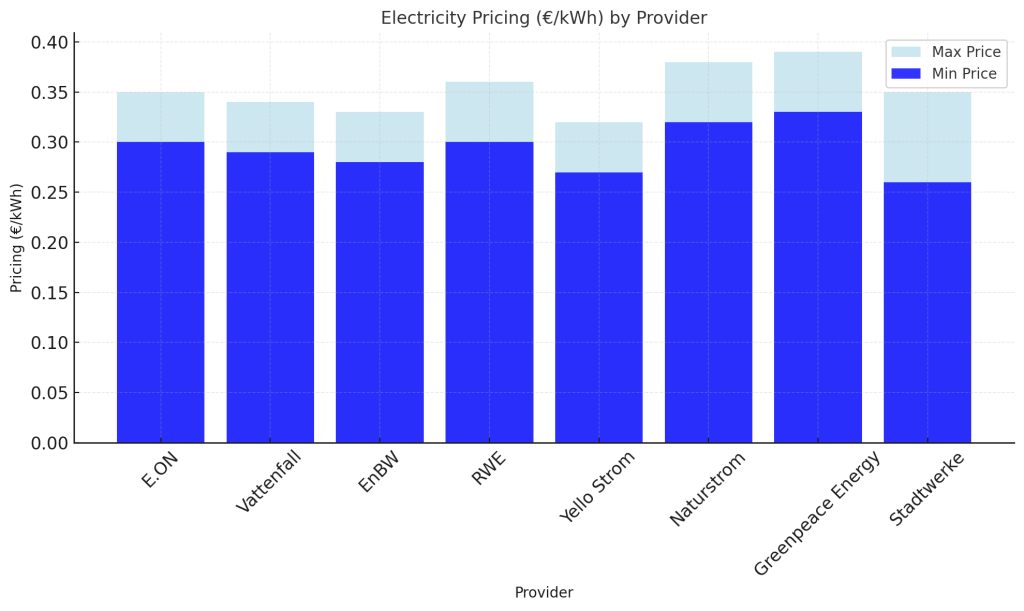Electricity Providers in Germany: Comprehensive Guide
Choosing the right electricity provider in Germany can be a complex task, given the variety of options available. Germany has a deregulated energy market, which means consumers can choose from many providers, each offering different services, pricing models, and contract terms. Below, we will explore some of the major electricity providers in Germany, highlighting their strengths and weaknesses to help you make an informed decision.

1. E.ON
Overview:
E.ON is one of Germany’s largest electricity providers and operates across Europe. The company offers a wide range of energy solutions, including renewable energy options, flexible tariffs, and comprehensive customer service.
Services & Features:
- Renewable Energy: E.ON offers green energy plans that are 100% renewable, supporting sustainable energy production.
- Smart Home Solutions: The company provides energy-efficient smart home systems, helping customers monitor and reduce energy consumption.
- Flexible Contracts: Options for fixed-term or flexible, cancellable contracts.
Pricing:
E.ON’s pricing depends on the type of contract and energy plan chosen. Fixed-term contracts may offer lower rates, while flexible options tend to be pricier. Prices range from €0.30 to €0.35 per kWh, depending on the location and energy consumption.
Pros:
- Large, well-established company with a strong reputation.
- Offers 100% green energy options.
- User-friendly online platform for managing contracts and payments.
- Comprehensive customer service, including multilingual support.
Cons:
- Prices can be higher than smaller, regional providers.
- Some customers report long wait times for customer service.
2. Vattenfall
Overview:
Vattenfall is a Swedish-owned energy company with a significant presence in Germany. Known for its commitment to sustainability, Vattenfall provides electricity generated from renewable sources, such as wind, solar, and hydroelectric power.
Services & Features:
- Sustainability: Offers 100% renewable energy plans, actively investing in green technology.
- Customer Support: Provides extensive customer service and an easy-to-use online account management system.
- Flexible Tariffs: Options for both fixed and variable rate plans.
Pricing:
Prices typically range from €0.29 to €0.34 per kWh, depending on the region and selected plan. Fixed contracts usually come with discounts, but early termination fees may apply.
Pros:
- Strong focus on renewable energy and environmental initiatives.
- Flexible contract options tailored to customer needs.
- Well-established provider with good reliability.
Cons:
- Not the cheapest option, especially for customers looking for budget-friendly plans.
- Some users have experienced delays in contract changes or billing adjustments.
3. EnBW (Energie Baden-Württemberg)
Overview:
EnBW is one of the largest energy suppliers in Germany, particularly popular in the Baden-Württemberg region. The company offers a mix of conventional and renewable energy, with a focus on innovation and digital solutions.
Services & Features:
- Green Energy: Offers options for renewable energy plans, although not all contracts are 100% green.
- Energy Efficiency Tools: Provides tools and tips for reducing energy consumption.
- Mobile App: Customers can manage their accounts, view bills, and monitor energy usage via EnBW’s app.
Pricing:
EnBW’s rates vary but generally range from €0.28 to €0.33 per kWh. They often offer promotions for new customers, such as discounted rates for the first year.
Pros:
- Strong focus on customer satisfaction and service quality.
- Mobile app and digital services make account management easy.
- Various energy options, including partially and fully renewable plans.
Cons:
- Renewable energy plans can be more expensive.
- Limited availability in some regions outside Baden-Württemberg.
4. RWE
Overview:
RWE is a major energy supplier in Germany and across Europe. Traditionally known for conventional energy production, RWE has been shifting towards renewables in recent years.
Services & Features:
- Energy Mix: Offers a combination of green and conventional energy plans.
- Innovative Projects: Investing heavily in wind and solar energy projects to transition to a greener energy portfolio.
- Customized Solutions: Tailored contracts for households and businesses.
Pricing:
RWE’s pricing can range from €0.30 to €0.36 per kWh, with various contract lengths and conditions. Green energy plans are generally priced higher than standard options.
Pros:
- Reliable energy provider with decades of experience.
- Active investment in renewable energy projects.
- Customizable plans for different types of consumers.
Cons:
- Historically associated with coal and nuclear energy, which may not appeal to environmentally conscious consumers.
- Higher prices compared to some smaller, independent providers.
5. Yello Strom
Overview:
Yello Strom is known for its marketing focus on simplicity and transparency. They aim to make energy services more accessible and user-friendly, particularly for tech-savvy customers.
Services & Features:
- Simple Contracts: Easy-to-understand contracts with no hidden fees.
- Digital Management: Offers a comprehensive online portal and mobile app for monitoring energy usage.
- Renewable Energy: Green energy options are available, although not all plans are 100% renewable.
Pricing:
Prices are competitive, generally ranging from €0.27 to €0.32 per kWh. Yello Strom is known for offering introductory discounts for new customers.
Pros:
- Transparent pricing and clear contract terms.
- Excellent digital tools for monitoring and managing energy consumption.
- Competitive pricing compared to larger providers.
Cons:
- Limited in-person customer service options.
- Renewable energy plans may not be as comprehensive as other green providers.
6. Naturstrom
Overview:
Naturstrom is a pioneer in providing 100% renewable energy in Germany. The company has a strong commitment to sustainability and supports numerous eco-friendly initiatives.
Services & Features:
- 100% Green Energy: All electricity is sourced from renewable energy projects within Germany.
- Support for Environmental Projects: A portion of revenue goes to funding green initiatives.
- Flexible Contracts: Offers both short-term and long-term contracts with fair conditions.
Pricing:
Naturstrom’s prices are higher, typically between €0.32 and €0.38 per kWh, reflecting their commitment to renewable energy.
Pros:
- Excellent choice for environmentally conscious consumers.
- Transparent business practices and ethical energy sourcing.
- Actively supports community and environmental projects.
Cons:
- Higher cost compared to conventional energy providers.
- Limited customer service hours and availability.
7. Greenpeace Energy
Overview:
Greenpeace Energy is a cooperative that focuses exclusively on providing green energy. The organization aligns with the values of Greenpeace, although it operates independently.
Services & Features:
- 100% Renewable Energy: Sourced from wind, solar, and hydroelectric power.
- Cooperative Model: Customers can become members and have a say in the company’s direction.
- Energy Transition Support: Actively promotes the transition to renewable energy across Germany.
Pricing:
Prices range from €0.33 to €0.39 per kWh. Membership in the cooperative requires a one-time fee, but it comes with the benefit of participating in decision-making.
Pros:
- Strong commitment to environmental protection.
- Transparent operations and cooperative model.
- Ideal for those who want to actively support the green energy movement.
Cons:
- Higher prices compared to non-renewable energy options.
- Membership fees may be a drawback for some customers.
8. Stadtwerke (Municipal Utilities)
Overview:
Stadtwerke refers to local municipal utilities that supply electricity in various German cities and towns. Each Stadtwerke operates independently and often focuses on regional energy needs.
Services & Features:
- Local Focus: Prioritizes local energy production and community projects.
- Green Energy Options: Many Stadtwerke offer renewable energy plans in addition to conventional electricity.
- Community Involvement: Profits often go back into funding local infrastructure and services.
Pricing:
Prices vary significantly between different Stadtwerke, typically ranging from €0.26 to €0.35 per kWh. Some providers offer discounts for local residents or special rates for long-term contracts.
Pros:
- Support local energy initiatives and projects.
- Competitive pricing and personalized service.
- Transparent and community-oriented business model.
Cons:
- Limited availability if you move outside the service area.
- Customer service quality can vary between different Stadtwerke.
How to Choose the Right Electricity Provider in Germany
When selecting an electricity provider in Germany, consider the following factors:
- Energy Source: If sustainability is a priority, opt for providers like Naturstrom, Greenpeace Energy, or Vattenfall, which offer 100% renewable energy.
- Contract Flexibility: Check the contract length and terms, including fees for early termination or changes.
- Pricing: Compare rates per kWh and any additional fees. Introductory offers can save you money initially but may increase after the first year.
- Customer Service: Look for providers that offer excellent customer support, especially if you prefer communication in English.
- Digital Tools: If you value convenience, choose a provider with a robust online portal or mobile app for easy account management.
Here’s a comparative overview of major electricity providers in Germany, highlighting their key features, pricing, and pros and cons:
| Provider | Renewable Energy Options | Pricing (€/kWh) | Contract Flexibility | Key Features | Pros | Cons |
|---|---|---|---|---|---|---|
| E.ON | Yes | 0.30 – 0.35 | Fixed and flexible | Smart home solutions, comprehensive customer service | Established reputation, user-friendly online platform, multilingual support | Higher prices compared to smaller providers, potential long customer service wait times |
| Vattenfall | Yes | 0.29 – 0.34 | Fixed and variable | Strong focus on sustainability, extensive customer support | Commitment to renewable energy, flexible contract options, reliable service | Not the cheapest option, potential delays in contract changes |
| EnBW | Partial | 0.28 – 0.33 | Fixed and flexible | Energy efficiency tools, mobile app for account management | Emphasis on customer satisfaction, digital services, various energy options | Renewable plans may be more expensive, limited availability outside Baden-Württemberg |
| RWE | Partial | 0.30 – 0.36 | Customized | Investment in renewable projects, tailored contracts | Reliable provider with experience, active in green energy transition | Higher prices, historical association with coal and nuclear energy |
| Yello Strom | Partial | 0.27 – 0.32 | Fixed and flexible | Transparent pricing, digital tools for energy monitoring | Competitive pricing, excellent digital services, clear contract terms | Limited in-person customer service, renewable options less comprehensive |
| Naturstrom | Yes | 0.32 – 0.38 | Short and long-term | 100% green energy, supports environmental projects | Ideal for eco-conscious consumers, transparent practices, community support | Higher costs, limited customer service hours |
| Greenpeace Energy | Yes | 0.33 – 0.39 | Cooperative model | 100% renewable energy, cooperative ownership | Strong environmental commitment, customer involvement in decision-making | Higher prices, membership fees required |
| Stadtwerke | Varies by region | 0.26 – 0.35 | Varies by provider | Local energy focus, community involvement | Supports local projects, competitive pricing, personalized service | Availability limited to specific regions, service quality varies |
Note: Pricing is approximate and can vary based on location, consumption, and specific contract terms.
When choosing an electricity provider in Germany, consider factors such as energy source, contract flexibility, pricing, customer service, and digital tools to find the best fit for your needs.
Germany’s electricity market offers a wide range of providers, each with unique features, pricing models, and commitments to sustainability. By understanding the pros and cons of each provider, you can make an informed decision that aligns with your budget and values. Whether you prioritize affordability, renewable energy, or flexibility, there is an electricity provider in Germany to meet your needs.
How informative was this article?
Click on a star to rate it!
We are sorry that this post was not useful for you!
Let us improve this post!
What is missing in the article?















